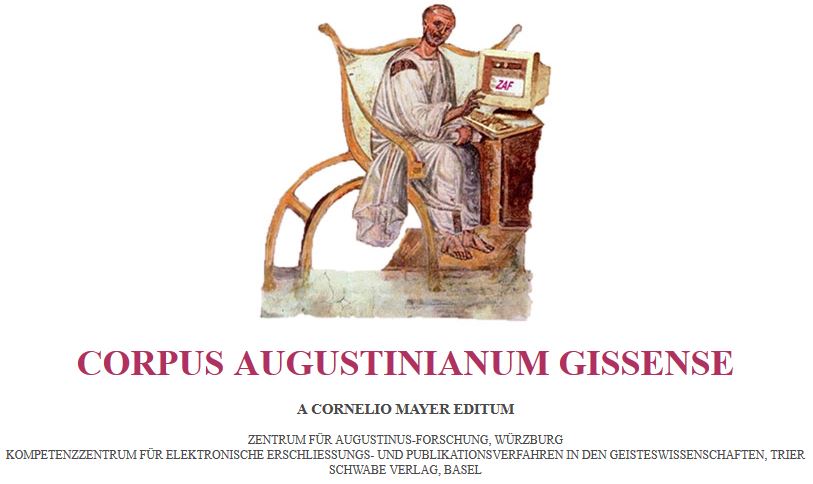Demo release free of charge
By means of a demonstration release, interested parties are invited to test the functions of the CAG-online with respect to Augustine’s early writing De uera religione – free of charge. Additional to the text of De uera religione (to be found under menue item ‹Content› nearly end of the list), the demo release also includes the titles of the Augustine secondary literature databank related to this ‹opusculum›.
Terms of use
Access to the CAG-online is to be regulated by subscription; any current payment systems are supported (purchase on account, credit card, paypal etc.).
For individuals there is offered a single user licence, which extends annually if not cancelled.
Use of the CAG-online at university libraries is possible via campus licence that provides any university member with access to CAG-online.
| Single-user licenses |
Individual price (1st Jahr) |
Price (subsequent year) |
Trial subscription (7 days) |
| Corpus Augustinianum Gissense online | € 278 | € 59 | € 29 |
| Campus licences |
1 year (price per year) |
3 years (price per year) |
5 years (price per year) |
| Corpus Augustinianum Gissense online | € 2,390 | € 1,790 | € 990 |
All prices include VAT. Subscription prices are effective for twelve months. Subscriptions may start during the year, with the latest version, and include regular updates and extensions. Campus licences allow unlimited simultaneous access. Trial subscription: for 30 days, possible only once. On presentation of their confirmation of matriculation, students will receive a 50% discount on the individual price for the first year of subscription.
| N.B. There is also offered a combination of CAG-online with AL-online («Augustinus package») with discount (see Classic Works of Augustine online). |
Weiterführende Links
CAG-online Licence portal (subscription facility)
The significance of lemmatisation for the users of text databases
Info: Lemmatisation is a linguistic procedure which assigns by means of numerical codes an actual word form appearing in a text to its grammatical base word form.
Disadvantages of non-lemmatised databases
Example: Search inquiry for ‹lex, legis› (= law) in the Augustinian oeuvre in conventional non-lemmatised databases:
Possible strategy 1: Request for lex and for leg*
Problem: You will find, additionally to ‹lex›, any inflected forms, but also any forms of the present stem and the perfect stem active of ‹legere› (= to read). Also derivates of ‹legalis, -e› or ‹legitimus, -a, -um› etc.
Possible strategy 2: Entry of any forms of ‹lex›:
Problem: You will have to search for 8 different forms, whereas you will have to take in consideration the overlapping with 4 forms of the verbum ‹legere›, which must be sorted out from the research result.
| lex | leges | lex | leges |
| legis | legum | legis | legum |
| legi | legibus | legi | legibus |
| legem | leges | legem | leges |
| lege | legibus | lege | legibus |
Advantages of lemmatised databases
Example: Search inquiry for ‹lex, legis› (= law) within the Augustinian oeuvre by means of the lemmatised text database of the Corpus Augustinianum Gissense a Cornelio Mayer editum (CAG-online):
Entry of l:lex
Result: Within some seconds you will find any of the 8.000 word forms of ‹lex› exclusively – identical forms of other words are not to be included.
Unique features of the CAG-online
- The base texts of the CAG-online have been assembled from the best available printed editions – critical ones where possible. Their misprints have, for the most part, been corrected. The recently discovered Sermones Dolbeau and Sermones Erfurt have been incorporated as well as the letters, edited within the Augustinian corpus, but not written by Augustine himself.
- Part of the CAG-online is, furthermore, a detailed and complete list of Augustine’s works, regarded as decisive for Augustinian research, including authentic titles, abbreviations and recent editions as well as ancillary information about Augustine’s Epistulae and Enarrationes in Psalmos.
- Every word form occurring in a text is lemmatised, i.e. it is categorized under its grammatical base form and will be found by a search request for this form. All Augustinian quotations, taken from the Bible, ancient literature or his own works, are designated as such in categories, and their sources are duly recorded; quotations from Greek appear in Greek letters.
- The retrieval software providing numerous possibilities of enquiry and indices was developed by the Competence Centre for Electronic Text Publishing at Trier University. The intuitive user guidance with extensive help functions is currently available in a German and an English version; other languages are being prepared.
- Furhermore, the CAG-online provides comfortable access to a data base of Augustinian primary and secondary literature, currently comprehending almost 38,000 bibliographical data records, developed with regard to content.
- Maintenance, updating and continuous improvement of the data stock are to be ensured by the Zentrum für Augustinus-Forschung at Würzburg University (ZAF). For CAG-online subscribers the relevant updates are available at zero extra cost.
The 3rd version of the Corpus Augustinianum Gissense a Cornelio Mayer editum (CAG 3 = CAG-online) is including the electronic corpus with any writings, sermons and letters of the philosopher and theologian Augustine of Hippo (354-430), delivered to posterity. Editor of the CAG-online is the famous Augustinian researcher and founder of the Augustinus-Lexikon, Cornelius Petrus Mayer.
As a web-based ressource, CAG-online does not require any local installation procedure. It is available via internet browser and does only depend on a computer with internet connection. CAG-online is also availabe on mobile devices (tablet and smartphone). Furthermore, see the tabs «Features», «Lemmatisation», «Licences», «Demo», «Links & download».
► CAG-online access (registered users)
► CAG-online demo version
► Licence portal CAG-online (possibility to subscribe)



